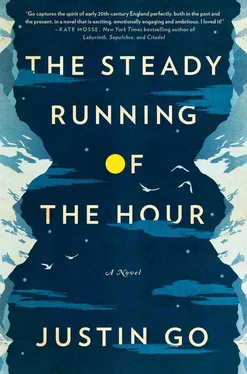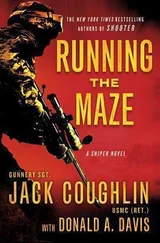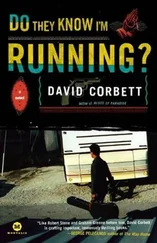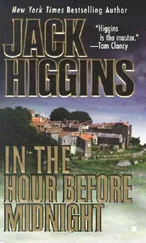I have a favor to ask. It’s a little strange, but trust me, it’s important. I need you to find a brooch in my grandmother’s jewelry box. It’s in the garage, in one of those cardboard boxes on the top shelf. I don’t know which box, but it’s labeled and should be near the top of the stack, since I looked through it last month. The jewelry box is green. Look for a silver brooch — it’s supposed to be a dragon and snakes, but it basically looks like a bunch of woven strands.
Can you mail the brooch to me as soon as you can? I’ll be eternally grateful. Send it to this address, the fastest delivery you can get, I’ll pay you back:
Circus Hostel
Weinbergsweg 1A
10119 Berlin
Germany
Thanks a million. When I’m back I’ll have some stories to tell.
Tristan
P.S. Don’t tell anyone about the brooch.

30 April 1924
Mount Everest Base Camp, 18,190 feet
Rongbuk Valley, Tibet
He stands in a maze of wooden crates scattered among the stones. The expedition arrived at the base camp yesterday. Along the valley the wind blows viciously, flurries of snow churning the darkening sky. The crates surround Ashley, their lids breached, their contents open to the snow. He gives instructions to a pair of porters in bad Hindustani, his hoarse voice barely above a whisper. The porters nod in incomprehension. Ashley lifts his head to the swirling sky and tightens the muffler around his neck.
The steep valley walls crumble to a floor of colorless pebbles and dirt. The expedition’s tents lie huddled beside a frozen lake, a moraine heap above lending meager shelter from the wind. On clearer days the mountain’s pyramid might loom in the sky, but for now the blizzard obscures all.
Ashley runs along a column of yaks, a screwdriver in his mittened palm, scanning the cases roped onto the animals. He calls at a Tibetan handler to halt a yak. The handler pats the animal and unropes the case onto the rocks. Ashley unscrews the lid and lifts a tin up to the dusk light. HARRIS’S SAUSAGES ARE THE BEST. He sorts the tins into other labeled crates, each of varied size so that they all hold forty pounds when correctly packed. Camp I, Camp II, Camp III, Camp IV. Ginger nut biscuits. Beef tongue. He screws the finished crates shut and paces among the emptied cases, squinting in the fading light. He ought to get his electric torch.
— Walsingham. Time for dinner.
Price approaches, a candle lantern swinging in his mitten. Ashley clears his throat and barks a reply.
— Something celebratory? Cheese omelette à la Rongbuk?
— No, Price says, Kami is under strict instructions. It’s the menu the general planned. Four courses and the champagne.
Ashley and Price cross the valley toward the mess tent, its four oil lamps glowing in the distance. They pass Mills, the young climber pounding a wooden stake with a huge stone. A porter holds the stake upright in the gale, his eyes fixed on his vulnerable fingers as he grips the wood. Mills waves at the two men.
— Come along, Price calls.
— Be right there.
They walk on. Beyond the curtain of blowing snow the army of hired local peasants prepares for the night. There are no tents for them. Some stack rocks to build shelters; others lie blanketless amid the snow, their thick woolen coats drawn tight over their chests. A few peasants struggle to relight a pile of yak dung in the wind. The dung is smoking, but no flame will come.
Price pauses to give instruction to a Gurkha corporal erecting a Whymper tent. Ashley waits beside them, stamping his feet to keep warm. They are only at the base camp and they are already wearing every stitch of their climbing kit.
A few minutes later they reach the mess tent. It is little warmer inside, but at least there is no wind. Most of the nine men are already seated at the table, each in his own camp chair. The folding table is without a cloth, the condiment bottles arranged neatly at the center. The colonel sits at the head of the table; Price and Ashley take their seats nearby. Price spreads his napkin over his lap and looks at the colonel.
— We need to have another powwow about the stores.
— After dinner, the colonel says. Let’s keep our appetites while we can.
Price nods. His camp chair is so low that only his head is above the level of the table. The brim of his hat hangs down over his face, save for where it is held up by a large safety pin covered in candlewax.
— What’s the first course?
— The quails, in pâté de fois gras . Also sardines and hard-boiled egg.
— The deployment of the quails at last, Ashley wheezes.
— Dear Lord, Somervell says. You sound like death himself.
— Air here isn’t quite up to Switzerland, Ashley remarks. Might be the dryness. Or the dust. Or the cold. Hard to say, really.
Price looks at his bare plate.
— I don’t suppose we’ve had menus printed?
— They’re coming by yak train from Lhasa, Somervell says. They’ll be here in forty days.
Mills clatters in, shaking the snow from his broad shoulders as he takes the last camp chair. A pair of Sherpas serving as mess waiters bring in the sardines, lifting portions onto each plate with a large spoon.
— I doubt a menu has ever been printed here, Noel remarks. They’ve only two printing presses in the entire country. With each page carved by hand out of wooden blocks.
— Two presses, Ashley says, and all those holy books in the monasteries? They must be busy.
— Those books are all they print, Noel says. It’s said they have no written history for the last thousand years.
The colonel waves at one of the Sherpas and says something in Nepali, then addresses the table in English.
— I say, let’s start with the fizz. You fellows have all earned it.
The Sherpa gives each man an aluminum mug painstakingly deiced over a spirit lamp. He fetches a green magnum bottle of champagne and uncorks it and wraps it in a dusty napkin. The Sherpa circles the table, rationing the wine carefully among the mugs. Ashley spears a sardine with his fork.
— No history at all?
— None has been found, Noel says. Those libraries have nothing but lamastic texts. One set of scriptures is a hundred volumes, a thousand pages per volume. Goes on the back of a dozen yaks. They’ve no time for anything else.
— Historyless, Ashley murmurs. That strikes me as jolly.
The colonel shakes his head.
— Jolly? I don’t see that living in ignorance of the past is jolly. Surely it condemns one to repeat mistakes.
— Strikes me as jolly, Price says.
— You two are only trying to get my blood up, the colonel says. For God’s sake, Price, you’re a teacher. Who has the quail?
— They’ve got two presses, Ashley says. So they can print only so much. They take religion over history. Seems sound to me.
— You’re an atheist, Price remarks.
There is much laugher.
— Soon to be a lamaist, Ashley says. I mean only that between wisdom and knowledge, one must choose wisdom.
Somervell lifts a piece of egg dubiously on the end of his fork.
— You’re presuming those books have wisdom. I presumed this egg was hard-boiled. It isn’t.
— We must send Kami to the Cordon Bleu, Ashley says. Let us start a subscription now.
— It’s the roarer cooker, Mills says. It takes about a case of paraffin to get a boil. And up here it’s a ten-minute egg.

Читать дальше













